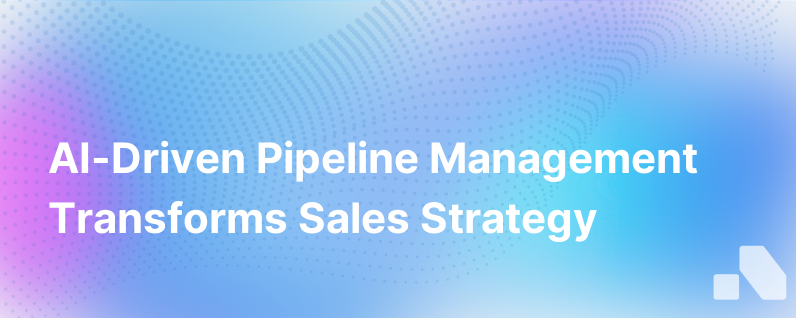From Guesswork To Confidence A Revolutionary Ai Driven Approach To Pipeline Management
Published on September 14, 2023 by David Zhang
In the high-stakes arena of B2B sales, the pipeline is the lifeline that sustains business growth and vitality. Historically, pipeline management has been fraught with uncertainty, relying heavily on guesswork and intuition. Sales forecasts were more akin to reading tea leaves than strategic analysis, leaving even the most seasoned sales veterans grappling with unpredictability. However, as we wade deeper into the digital age, a revolutionary AI-driven approach to pipeline management is changing the sales landscape.
The Perils of Traditional Pipeline Management
Traditionally, managing a sales pipeline has been an exercise in constant vigilance. Sales professionals would spend countless hours logging activities, updating stages, and forecasting deals based on gut feelings and historical comparisons. Despite their best efforts, these predictions were often off the mark, leading to missed targets and strategic missteps.
The root of this imprecision lies in the limitations of human analysis. Even the sharpest minds can overlook patterns or correlations when faced with the complexity of modern sales data. Additionally, cognitive biases and emotional influences can skew perception and decision-making, leading to suboptimal outcomes.
A New Dawn: AI-Driven Pipeline Management
Enter Artificial Intelligence and its groundbreaking ability to transform vast quantities of data into clear, actionable insights. AI-driven pipeline management tools, like Aomni, dismantle the traditional barriers of bias and limited processing capacity, offering a more confident and accurate method for sales teams to manage their pipelines.
These tools utilize machine learning algorithms to sift through mountains of historical and real-time data, identifying trends and patterns that would go unnoticed by the human eye. By processing data from CRM systems, email exchanges, customer interactions, and more, AI creates a full-spectrum view of the pipeline's health.
The AI Advantage
-
Data-Driven Decision Making: Rather than relying on hunches, AI provides solid data that sharpens decision-making. It uncovers insights such as which deals are most likely to close, which require immediate attention, and the most effective paths to conversion.
-
Enhanced Forecasting Accuracy: AI algorithms can predict future sales performance with remarkable accuracy, integrating diverse variables and market conditions into forecasts. This allows companies to allocate resources more efficiently and strategize with greater confidence.
-
Time-Saving Automation: Routine tasks like data entry, opportunity ranking, and pipeline reporting can be automated through AI. This frees up sales reps to focus on relationship-building and strategic selling rather than administrative work.
-
Personalized Customer Engagement: AI can analyze customer data to deliver personalized, timely content that resonates with prospects at various stages of the pipeline, thus nurturing leads more effectively.
-
Real-Time Insights: AI tools provide real-time analysis, offering an up-to-the-minute snapshot of the sales pipeline. Sales leaders can quickly react to shifting dynamics, adapting their strategies to maintain momentum and avoid missed opportunities.
Implementing AI-Driven Pipeline Management
Adopting an AI-driven approach requires a blend of technology, strategy, and culture. To start, companies must ensure they have the right infrastructure to support AI, which often means investing in robust CRM platforms capable of integrating with AI tools. Next, they must establish processes that leverage AI insights, such as dynamic forecasting models and programmatic lead scoring systems.
Moreover, a cultural shift is often necessary. Sales teams must be willing to transition from instinctive to data-driven practices. This may entail training and change management to align the organization with new methodologies.
Bridging Implementation Challenges
As transformative as AI-driven tools can be, their implementation is not without challenges. Data quality is paramount; AI models are only as good as the data they are fed. As such, companies must maintain clean, up-to-date, and comprehensive datasets to reap the benefits of AI analytics.
Another challenge lies in interpreting AI-generated insights. While AI can offer predictions and probabilities, translating these into effective sales actions requires a degree of sales acumen and strategic thinking. Sales teams must learn to combine AI insights with contextual knowledge of customers and markets to achieve the best outcomes.
Aomni: The End of Guesswork
Aomni is a leading example of how AI is redefining pipeline management. This AI-driven platform empowers sales teams by delivering:
- Real-time account research
- Actionable competitive insights
- Personalized sales content in 15 minutes or less
By harnessing AI's power, Aomni eliminates guesswork and grants sales teams unprecedented control over their pipelines. The result is a strategic, informed approach that can dramatically shift sales outcomes from uncertainty to impressive clarity.
Conclusion
In conclusion, the adoption of AI in pipeline management symbolizes a pivotal shift from guesswork to confidence. The impact is transformative, injecting precision and insight into every stage of the sales process. For companies that embrace this revolution, the rewards are manifold. Sales cycles shrink, forecasts become reliable, and the pathway to revenue growth is illuminated with newfound clarity.
In embracing AI, we're not just enhancing our existing processes - we're redefining the strategy and execution of sales pipeline management. The age of uncertainty is over; we are ushering in an era of strategic foresight and empowered decision-making.